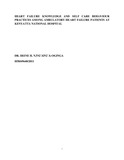| dc.contributor.author | Ng'ang’a-Oginga, I. H. N | |
| dc.date.accessioned | 2016-12-22T08:16:43Z | |
| dc.date.available | 2016-12-22T08:16:43Z | |
| dc.date.issued | 2016 | |
| dc.identifier.uri | http://hdl.handle.net/11295/98227 | |
| dc.description.abstract | Background
Heart Failure (HF) is a global public health problem associated with a high consumption of medical resources. It is considered a worldwide epidemic and the incidence and prevalence is increasing in developed countries. HF is associated with a high morbidity and mortality despite advances in pharmacological therapy. Self care has been found to impact significantly on HF outcomes and this is highly dependent on patients‘ HF knowledge and self care behaviour practices. Regionally in Africa, there have been very few studies on HF knowledge and self care behaviour practices in patients on follow-up for HF. In our local set up at Kenyatta National Hospital (KNH), there has been no study conducted to assess the adequacy of HF knowledge as well as the level of adherence to different aspects of self care behaviour in HF patients on follow-up at the cardiology clinic.
Objectives
The aim of this study was to determine HF self care behaviour practices and HF knowledge among ambulant HF patients at KNH and to explore any associations between HF knowledge scale scores and self care behaviour scale scores with demographic variables, level of formal education and duration of HF follow-up.
Study design and site
This was a cross sectional descriptive study at the Kenyatta National Hospital, cardiology clinic.
Study Participants
Study participants were all adult patients with a chart diagnosis of HF that fulfilled the Framingham HF diagnostic criteria retrospectively applied and on follow-up for at least 3 months.
Methods
The study was a cross-sectional descriptive study and was conducted over a period of four months in order to achieve the desired sample size of 288 HF patients. Patients with HF and on follow up at the KNH cardiology clinic for three months or more were screened for eligibility and recruited upon signing informed consent. Patients‘ socio-demographic data and clinical information was entered into a study proforma. Two pre-tested and validated self-administered questionnaires; the modified Dutch Heart Failure Knowledge Scale (DHFKS) and the modified European Heart Failure Self Care Behaviour scale (EHFSCBs) were used to determine HF knowledge and HF self care behaviour respectively.
xii
Data Management
Questionnaires were coded and verified for completeness. Cleaning of data was done before data entry and analysis was done using Statistical Package for Social Sciences (SPSS) version 21.Descriptive statistics were used to describe socio demographic variables. Means and medians were used for continuous data while percentages and proportions were used for categorical data. Logistic regression was used to determine factors independently associated with adequate HF knowledge and self care behaviour.
Results
Utilizing the DHFKS, the prevalence of poor HF knowledge scores among ambulatory HF patients at KNH was 89.6%. HF knowledge was particularly poor in thematic areas dealing with HF management, symptom recognition and symptom management. As regards self care behaviour practices and utilizing the EHFSCBs, 50.8% of the study participants had poor SCB practices. We found no trends in associations between HF knowledge and HF SCB practices and demographic variables as well as duration of HF follow up probably because the study was not adequately powered to detect any significant associations.
Conclusions
Majority of ambulatory HF patients in KNH had poor HF knowledge while half the study participants had poor SCB. | en_US |
| dc.language.iso | en | en_US |
| dc.publisher | University of Nairobi | en_US |
| dc.rights | Attribution-NonCommercial-NoDerivs 3.0 United States | * |
| dc.rights.uri | http://creativecommons.org/licenses/by-nc-nd/3.0/us/ | * |
| dc.subject | Heart Failure Knowledge And Self Care Behaviour Practices Among Ambulatory Heart Failure Patients | en_US |
| dc.title | Heart Failure Knowledge And Self Care Behaviour Practices Among Ambulatory Heart Failure Patients At Kenyatta National Hospital | en_US |
| dc.type | Thesis | en_US |
| dc.description.department | a
Department of Psychiatry, University of Nairobi, ; bDepartment of Mental Health, School of Medicine,
Moi University, Eldoret, Kenya | |



